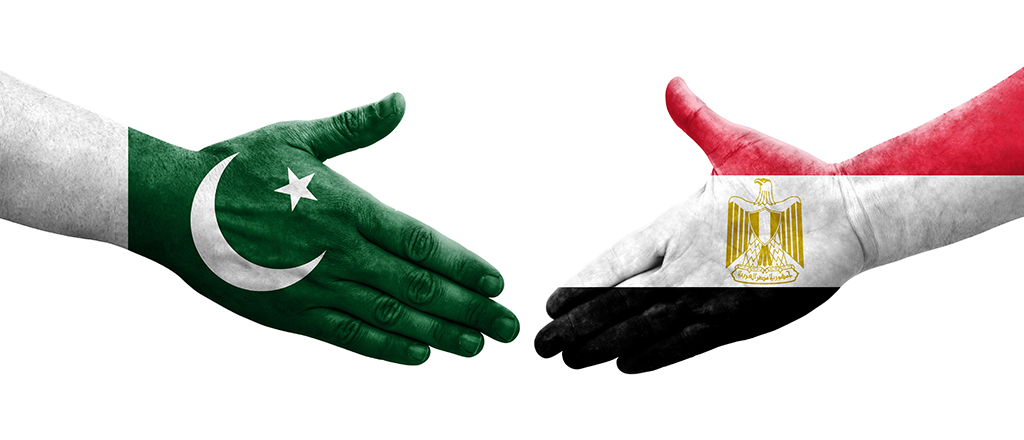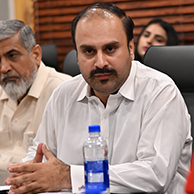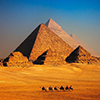The Relationship Between Pakistan and Egypt: A 75-Year Historical Overview

Introduction
Pakistan, situated in South Asia, is a densely populated and culturally diverse nation. Its population primarily speaks Indo-Iranian languages, and the country has deep historical and cultural connections with neighbouring nations like Iran, Afghanistan, and India. Pakistan gained independence from British rule on August 14, 1947, celebrated as Independence Day, and its predominantly Muslim population sets it apart from its larger south-eastern neighbour.
The country's geographical features are incredibly diverse, ranging from the towering Pamirs and the Karakoram Range in the northwest to a complex network of mountains, valleys, and plateaus. This diverse terrain gradually transitions into the flat and fertile Indus River plain, extending southward until it meets the Arabian Sea.
Pakistan has a rich historical connection to the Silk Road and is famous for the Khyber Pass, a historic corridor facilitating external influences into the relatively isolated subcontinent. The mountainous regions, including iconic peaks like K2 and Nanga Parbat in Pakistani-administered Kashmir, present a challenging opportunity for mountaineers. Along the Indus River lies the ancient site of Mohenjo-daro, one of the cradles of civilization.
The Pakistani economy has undergone significant diversification since its initial focus on agriculture at the time of independence. Agriculture, once dominant, now contributes around one-fifth of the GDP, with manufacturing accounting for roughly one-sixth. The trade and services sectors, when combined, make up the largest part of the economy and have experienced substantial growth. Pakistan's economic structure is more similar to middle-income countries in East and Southeast Asia than to less prosperous nations in the Indian subcontinent. The country's economic performance has been commendable, maintaining a consistent and steady annual growth rate since gaining independence.
Egypt, often called the "Gift of the Nile," is a land of profound historical importance and a vibrant contemporary culture. Situated in the north-eastern part of Africa, Egypt holds a unique position as a bridge between the Middle East and Africa. Its rich heritage and natural wonders have fascinated the world for thousands of years. This article explores the diverse facets of Egypt, from its ancient marvels to its dynamic modern life. Egypt's capital and largest city, Cairo, is a bustling metropolis where the past and present seamlessly coexist. Here, you'll find the Egyptian Museum, which houses an extensive collection of artifacts from ancient Egypt, including the renowned treasures of Tutankhamun. Among the Seven Wonders of the Ancient World, the Pyramids of Giza stand as the most iconic symbols of Egypt. Constructed over 4,500 years ago, the Great Pyramid, the Pyramid of Khafre, and the Pyramid of Menkaure continue to astonish visitors with their architectural magnificence and historical significance. The ancient Egyptians pioneered a complex system of hieroglyphic writing and were among the earliest cultures to use papyrus as a writing material. These innovations played a pivotal role in documenting their history and culture. Egypt grapples with various challenges, including economic inequalities, political transitions, and environmental issues. Nevertheless, the resilience and determination of the Egyptian people to build a prosperous and inclusive society continue to shape the nation's future.
Egypt's economy has undergone a significant transformation from a highly centralized system focused on import substitution during President Gamal Abdel Nasser's era (1954-1970) to a more diversified and market-oriented approach under President Abdel Fattah el-Sisi, as outlined in Egypt's 2030 Vision. As of 2023, Egypt boasts the third-largest economy in Africa by nominal GDP, ranking 41st globally.
Beginning in the 2000s, a series of structural reforms encompassing fiscal and monetary policies, taxation, privatization, and business legislation have propelled Egypt toward a more market-driven economy. These reforms have also attracted increased foreign investment, contributing to robust annual macroeconomic growth. With these economic changes, Egypt has made significant strides in addressing pressing issues such as unemployment and poverty, resulting in notable declines in these areas. The country benefits from political stability, its strategic proximity to Europe, and a boost in exports. For prospective investors, Egypt represents a stable and appealing destination, supported by both internal reforms and external stakeholders.
The diplomatic ties between Pakistan and Egypt have prospered for 75 years, demonstrating the enduring strength and depth of their friendship. Despite their geographical separation, these two countries have cultivated a robust and lasting connection due to shared values, historical ties, and common interests. This article delves into the evolution of Pakistan and Egypt's relationship, tracing its history from its beginnings to the contemporary era.
Pak-Egypt Relations
Egypt-Pakistan relations encompass the bilateral ties between the Arab Republic of Egypt and the Islamic Republic of Pakistan. The roots of this modern relationship can be traced back to 1947 when Pakistan's founder, Muhammad Ali Jinnah, made a farewell visit to Egypt in response to a special invitation from King Fuad II, marking an early chapter in their diplomatic history. Both nations maintain diplomatic missions, with Egypt having an embassy in Islamabad, and Pakistan having an embassy in Cairo. Additionally, Egypt and Pakistan are active members of international organizations such as the Organisation of Islamic Cooperation (OIC) and the "D8" group of developing nations. It's noteworthy that both Egypt and Pakistan hold the status of Major Non-NATO Allies, which grants them certain privileges, including access to specific levels of hardware and surplus military equipment from the United States.
These two nations share a close nationalist bond as they were both founded as modern nation-states during an era marked by nationalism, each with a predominantly Muslim population. Modern Egypt recognizes Muhammad Ali of Egypt as its founder, while Muhammad Ali Jinnah holds the same status as the founder of Pakistan.
Both nations encountered similar challenges in their formative years, as they aspired to achieve socio-economic progress, political stability, and liberation from colonial influences. A pivotal moment in their early diplomatic history was the Bandung Conference in 1955, a gathering that brought together leaders from Asia and Africa, including Pakistan and Egypt. At this conference, they deliberated on common objectives such as decolonization, sovereignty, and economic development. This significant event solidified their dedication to cooperation and collaboration. Throughout the 1950s and 1960s, Pakistan and Egypt continued to strengthen their diplomatic relations. They collaborated in various international forums, notably the Non-Aligned Movement, where they advocated for the cause of non-alignment during the Cold War era.
The 1970s represented a pivotal moment in the relationship between Pakistan and Egypt. It was during this decade that both nations showcased their strong commitment to each other, particularly during the Arab-Israeli conflict in 1973. Pakistan demonstrated solidarity with Egypt by offering military assistance, which included sending pilots and personnel. This support played a crucial role in solidifying their strategic alliance. Beyond military cooperation, the 1970s also witnessed a flourishing of cultural exchange programs between the two countries. Pakistani students flocked to Egyptian universities, and conversely, Egyptian students pursued their education in Pakistan. These exchanges contributed to a deeper mutual understanding of each other's cultures and traditions. Al-Azhar University remains committed to granting more scholarships annually to Pakistani students, and there are plans to raise this number of scholarships in the near future. Furthermore, Egyptian professors have been dispatched to teach at the International Islamic University in Islamabad. Additionally, Pakistani scholars are recipients of scholarships provided by the Egyptian Ministry of Agriculture.
Economic and Humanitarian Cooperation
In the latter part of the 20th century, Pakistan and Egypt witnessed a notable expansion in their economic cooperation. Bilateral trade between the two nations experienced substantial growth, driven by the synergy between their economies. Egypt's proficiency in agriculture complemented Pakistan's industrial capabilities, fostering opportunities for collaboration. Moreover, Egypt and Pakistan have initiated new avenues for collaboration in various sectors, including agriculture, healthcare, higher education, technical assistance, information and communication technology (ICT), and other domains.
Furthermore, the establishment of the Pakistan-Egypt Joint Ministerial Commission played a pivotal role in advancing economic relations. This commission facilitated the negotiation of trade agreements and the promotion of increased investments in sectors like agriculture, textiles, and technology. These concerted efforts further solidified their economic partnership.
In the 21st century, Pakistan and Egypt have remained steadfast in their cooperation across various domains, with a notable emphasis on fostering regional stability. Both countries have assumed crucial roles within the Organization of Islamic Cooperation (OIC) and consistently championed peaceful conflict resolutions in the Middle East and South Asia. Moreover, Pakistan and Egypt have joined forces on counter-terrorism efforts, intelligence exchange, and coordinated military exercises to address shared security concerns. This collaborative approach underscores their mutual dedication to combating extremism and terrorism. Egypt has consistently extended its support to Pakistan in its efforts to combat terrorism. In May 2009, acting on direct orders from former President Hosni Mubarak, an Assistant Foreign Minister from Egypt visited Islamabad to express Egypt's unwavering solidarity with the Pakistani people and government. As a testament to this support, Egypt became the first nation to dispatch relief aid for the Internally Displaced Persons (IDPs) during that period. Egypt continues to provide humanitarian assistance to Pakistan for the same purpose, underscoring its ongoing commitment to assisting in times of need.
Trade Relations
In the year 2000, both countries signed a Bilateral Investment Treaty. This treaty aims to promote and mutually protect investments, creating a conducive environment for business growth. Consequently, various Egyptian enterprises have invested in the Pakistani market, while several Pakistani investments have been made in Egypt, particularly in the textile sector.
In 2021, Egypt's exports to Pakistan amounted to $466 million. The primary products that Egypt exported to Pakistan included Petroleum Gas ($325 million), Raw Cotton ($24.4 million), and Sowing Seeds ($13.8 million). Over the past 26 years, Egypt's exports to Pakistan have experienced a significant annualized growth rate of 19.5%, surging from $4.56 million in 1995 to $466 million in 2021. Conversely, Pakistan's exports to Egypt in 2021 totalled $110 million. The key products that Pakistan exported to Egypt included Heavy Pure Woven Cotton ($43.5 million), Heavy Mixed Woven Cotton ($9.22 million), and Jute Woven Fabric ($5.37 million). Over the same 26-year period, Pakistan's exports to Egypt have exhibited a steady annualized growth rate of 5.97%, increasing from $24.4 million in 1995 to $110 million in 2021.
Egypt and Pakistan have achieved a significant milestone in their bilateral trade relations by recording a substantial trade volume of $200 million. This achievement was prominently featured during the recent Pakistan-Egypt Business Opportunities Conference.
Sajid Bilal, Pakistan's ambassador to Cairo, extended a warm welcome to the attendees and underscored the significance of the event as an excellent opportunity to strengthen bilateral relations, particularly in the realms of trade and investment.
Shahiraz Malik, the president of the Rawalpindi Chamber of Commerce and Industry, elaborated on the conference's importance in advancing trade and investment ties between the two nations. He highlighted the participation of over 150 Pakistani companies operating in diverse sectors, including construction, textiles, pharmaceuticals, medical supplies, IT, and automobile parts.
During the conference, the head of Egypt's Trade Representation stressed the importance of familiarizing the Egyptian business community with collaborative opportunities. The event is expected to serve as a platform for fostering partnerships between Egyptian and Pakistani stakeholders, especially in the context of China's Belt and Road Initiative. Both the Suez Canal in Egypt and the Gwadar Port in Pakistan hold considerable importance as key ports along the Maritime Silk Route. These strategic locations offer substantial opportunities for collaboration and increased trade exchange.
In addition to the noteworthy $200 million in trade volume, it's worth noting that there has been a substantial investment volume of approximately $400 million across various sectors. These sectors include construction, services, textiles, medical tools (with a particular focus on surgical tools), tourism, agriculture, and more.
During the conference, several significant developments occurred. The Minister of the Business Sector and the head of the Trade Representation signed approximately five cooperation agreements between Egyptian and Pakistani companies, further solidifying the prospects for collaboration.
Conducted in partnership with the Pakistani embassy in Cairo, the event was hosted by the Rawalpindi Chamber of Commerce and Industry, one of Pakistan's oldest and most influential chambers. Its primary objective was to enhance and fortify trade and investment ties between Egypt and Pakistan. Notably, the conference coincided with the celebration of the 75th anniversary of diplomatic relations between the two countries.
Conclusion
The relationship between Pakistan and Egypt has deep historical roots and spans over 75 years. Despite their geographical separation, these two countries have cultivated a strong and enduring connection characterized by shared values, historical ties, and common interests. Pakistan and Egypt share a close nationalist bond, as both were founded as modern nation-states during an era marked by nationalism and have predominantly Muslim populations. Their diplomatic history dates back to Pakistan's founder, Muhammad Ali Jinnah's visit to Egypt in 1947. In the 21st century, Pakistan and Egypt have continued their cooperation, focusing on regional stability, counter-terrorism efforts, intelligence exchange, and military exercises to address shared security concerns. Egypt has provided humanitarian assistance to Pakistan in times of need, showcasing its unwavering support. Trade relations have also expanded significantly, with trade volumes reaching $200 million. Investment opportunities across various sectors, including construction, textiles, pharmaceuticals, medical supplies, IT, and agriculture, have further strengthened economic ties. Overall, the relationship between Pakistan and Egypt remains robust and multifaceted, characterized by mutual cooperation, shared interests, and a commitment to regional stability and economic growth.
His strategic vision and unwavering commitment to excellence have been instrumental in driving our company's growth and success. Zaildar Ahsan shah is not only a visionary leader but also a dedicated advocate for our team, fostering a culture of innovation, collaboration, and continuous improvement. Under his guidance, our company has not only met but exceeded its goals, positioning us as a market leader in Elaan Research centre.







